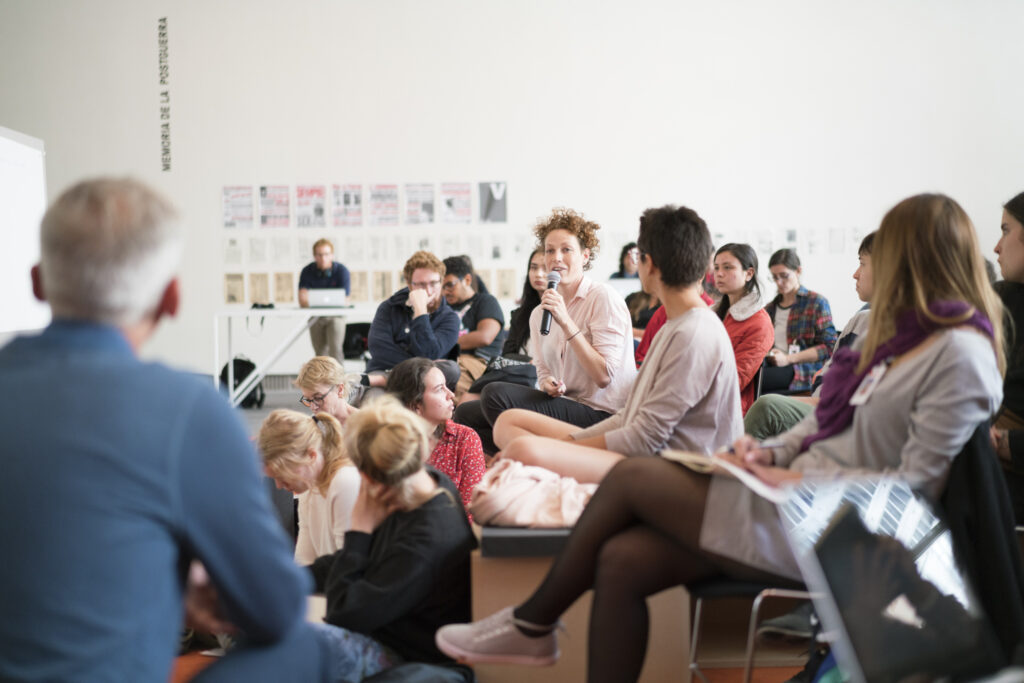
Escuela de Arte Útil (installation view), a commissioned art project for the exhibition Tania Bruguera: Talking to Power / Hablándole al Poder, Yerba Buena Center for the Arts, San Francisco, 2017; image: courtesy Yerba Buena Center for the Arts; photo: Nando Alvarez-Perez
Symposium
Does Art Have Users? Day Two
Thursday, Sept 28, 2017
10:30 a.m.
Panel: Can We Teach Artists to Be Useful?
Time: 10:30 a.m.-noon
Location: Yerba Buena Center for the Arts
Participants: Tania Bruguera, Stephen Wright, Oriol Fontdevila; moderated by Lucia Sanroman
Artist Bruguera is joined by Wright and Fontdevila for an analysis of the effectiveness of an alternative pedagogical model. Moderated by Sanroman, the conversation addresses and evaluates the eight-week-long curriculum of the Escuela de Arte Útil. The school is a commission from Bruguera for the exhibition Talking to Power / Hablándole al Poder, realized in collaboration with the Asociación de Arte Útil; the San Francisco Art Institute; California College of the Arts; the University of California, Berkeley; San Francisco State University; and YBCA Fellows.
Presentations: What Can We Learn about Art’s Social Uses?
Time: 12:30–2 p.m.
Location: Yerba Buena Center for the Arts
Participants: students of Escuela de Arte Útil; moderated by Alessandra Saviotti
The session focuses on the presentation of students’ prototypes of Arte Útil projects realized as part of Escuela de Arte Útil. Students considered topics such as institutional self-criticism, active hyperrealism, a-legality, reforming capital, sustainable outcomes, and usership, as well as intersections with other disciplines and modes of creative collaboration.
Panel: What Happens at the Intersection of Art and Data?
Time: 4-5:30 p.m.
Location: SFMOMA, Phyllis Wattis Theater
Participants: Josette Melchor, Burak Arikan, Carla Wozjcuk; moderated by Jon Christensen
This session unpacks ways that artists find creative uses for data and technology to support strategies for social change in the Bay Area and beyond. With speakers whose work encompasses art, activism, academia, and community organizing, the panel will explore how ideas and practices from these different fields intersect with and challenge ideas about design and technology in the context of attempts to improve civic life.
Panel: What Does a Useful Museum Look Like?
Time: 6-7:30 p.m.
Location: SFMOMA, Phyllis Wattis Theater
Participants: Jeanne van Heeswijk, Alistair Hudson, Laura Raicovich; moderated by Dominic Willsdon
This panel will explore new approaches to the role and value of art institutions, looking in particular at ways that museums might borrow an idea of usership from libraries, to become more of a resource than an attraction. Speakers will discuss how art museums can build coalitions of different organizations with a public mission to serve a wider range of constituents, and how museums can adapt to accommodate and support artists who want to work in the context of civic engagement.
Opening: Public Knowledge Library
Time: 7:30–9 p.m.
Location: SFMOMA, Koret Education Center
Join us for the opening of the newest branch of the San Francisco Public Library (SFPL) on the museum’s second floor. Through winter 2019 the Koret Education Center will be transformed into a pop-up branch known as the Public Knowledge Library, featuring a reference collection of books and newspapers focused on art, activism, cities, culture, education, and technology. The library also will feature artist installations, curated displays about the history of SFPL, and a special children’s collection. For more information on the Public Knowledge initiative, please visit publicknowledge.sfmoma.org.
Part of SFMOMA’s Phyllis Wattis Distinguished Lecture Series, as well as our Public Knowledge initiative, Does Art Have Users? is presented in partnership with the Asociación de Arte Útil and the Yerba Buena Center for the Arts and its exhibition Tania Bruguera: Talking to Power / Hablándole al Poder.


